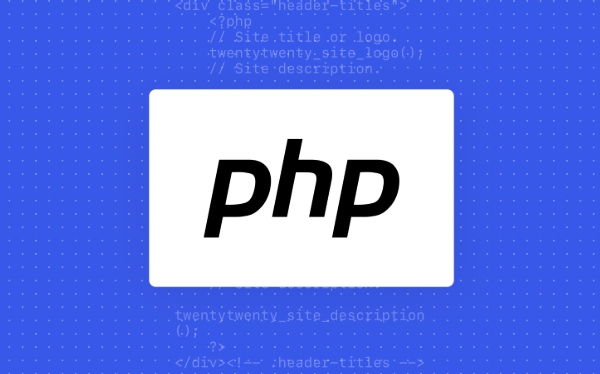柔軟なPHPアプリケーションを構築するための高度な条件パターン
使用策略模式将条件逻辑替换为可互换行为;2. 采用空对象模式消除空值检查;3. 运用状态模式让对象根据内部状态改变行为;4. 通过规格模式组合复杂业务规则;5. 结合命令模式与守卫实现无条件执行控制;6. 使用基于类的分发替代switch语句;这些模式通过将条件逻辑转化为多态和组合,提升代码的可维护性、可测试性和扩展性,从而构建更灵活的PHP应用。

When building flexible and maintainable PHP applications, relying solely on basic if-else statements can quickly lead to rigid, hard-to-maintain code. Advanced conditional patterns allow developers to write more dynamic, scalable, and readable logic. These patterns go beyond simple branching and embrace design principles that promote separation of concerns, testability, and extensibility.

Here are several advanced conditional patterns you can use to make your PHP applications more adaptable.
1. Strategy Pattern: Replace Conditional Logic with Interchangeable Behaviors
Instead of using long switch or if-elseif chains to determine behavior, encapsulate each variation into its own class using the Strategy pattern.

Example: Payment Processing
interface PaymentProcessor
{
public function process(float $amount): bool;
}
class CreditCardProcessor implements PaymentProcessor
{
public function process(float $amount): bool
{
// Process credit card
return true;
}
}
class PayPalProcessor implements PaymentProcessor
{
public function process(float $amount): bool
{
// Process via PayPal
return true;
}
}
class PaymentService
{
private PaymentProcessor $processor;
public function setProcessor(PaymentProcessor $processor): void
{
$this->processor = $processor;
}
public function execute(float $amount): bool
{
return $this->processor->process($amount);
}
}Why it’s better:

- No conditionals needed when selecting logic
- Easy to add new payment methods
- Promotes dependency injection and testing
Use this when:
- You have multiple algorithms for the same task
- Behavior changes based on context or configuration
2. Null Object Pattern: Eliminate Null Checks
Instead of scattering if ($object !== null) checks, use a Null Object that implements the same interface but does nothing.
interface Logger
{
public function log(string $message);
}
class FileLogger implements Logger
{
public function log(string $message)
{
file_put_contents('app.log', $message . PHP_EOL, FILE_APPEND);
}
}
class NullLogger implements Logger
{
public function log(string $message)
{
// Do nothing
}
}
class UserService
{
private Logger $logger;
public function __construct(Logger $logger = null)
{
$this->logger = $logger ?? new NullLogger(); // Avoid null checks
}
public function register(string $email)
{
// No need to check if logger is null
$this->logger->log("User registered: $email");
}
}Benefit: Cleaner code, fewer defensive conditionals.
3. State Pattern: Let Objects Change Behavior Based on Internal State
When an object’s behavior changes drastically based on its state, avoid conditionals like if ($status === 'active') by externalizing state logic.
interface OrderState
{
public function ship(OrderContext $order);
public function cancel(OrderContext $order);
}
class PendingState implements OrderState
{
public function ship(OrderContext $order) { /* Not allowed */ }
public function cancel(OrderContext $order) { $order->setState(new CancelledState()); }
}
class ShippedState implements OrderState
{
public function ship(OrderContext $order) { /* Already shipped */ }
public function cancel(OrderContext $order) { /* Can't cancel */ }
}
class OrderContext
{
private OrderState $state;
public function __construct()
{
$this->state = new PendingState();
}
public function setState(OrderState $state)
{
$this->state = $state;
}
public function ship() { $this->state->ship($this); }
public function cancel() { $this->state->cancel($this); }
}This removes conditionals like:
if ($this->status === 'pending') {
$this->status = 'shipped';
}Instead, behavior is delegated to the current state object.
4. Specification Pattern: Compose Complex Business Rules
Use boolean logic via objects to represent business rules. This is especially useful for validation or filtering.
interface Specification
{
public function isSatisfiedBy($candidate): bool;
public function and(Specification $other): Specification;
public function or(Specification $other): Specification;
public function not(): Specification;
}
class AgeSpecification implements Specification
{
private int $minAge;
public function __construct(int $minAge)
{
$this->minAge = $minAge;
}
public function isSatisfiedBy($candidate): bool
{
return $candidate->age >= $this->minAge;
}
public function and(Specification $other): Specification
{
return new AndSpecification($this, $other);
}
// ... similarly for or(), not()
}Now you can compose rules:
$canVote = (new AgeSpecification(18))->and(new CitizenshipSpecification('US'));
if ($canVote->isSatisfiedBy($user)) { ... }This replaces complex nested conditionals with readable, reusable rule objects.
5. Command Pattern with Guards: Conditional Execution Without Ifs
Combine the Command pattern with preconditions (guards) to control execution flow.
interface Command
{
public function canExecute(): bool;
public function execute();
}
class DeleteAccountCommand implements Command
{
private User $user;
public function __construct(User $user)
{
$this->user = $user;
}
public function canExecute(): bool
{
return $this->user->isVerified() && !$this->user->hasActiveSubscriptions();
}
public function execute()
{
if (!$this->canExecute()) {
throw new RuntimeException("Cannot execute command");
}
// Perform deletion
}
}Then process commands generically:
foreach ($commands as $cmd) {
if ($cmd->canExecute()) {
$cmd->execute();
}
}This centralizes conditional logic and makes command pipelines easy to manage.
6. Use Class-Based Dispatching Instead of Switch Statements
Instead of:
switch ($type) {
case 'pdf': return new PdfExporter();
case 'csv': return new CsvExporter();
// ...
}Use a map of types to classes:
class ExporterFactory
{
private array $map = [
'pdf' => PdfExporter::class,
'csv' => CsvExporter::class,
];
public function make(string $type): Exporter
{
if (!isset($this->map[$type])) {
throw new InvalidArgumentException("Unknown type: $type");
}
return new $this->map[$type]();
}
}Even better: use a DI container to resolve them dynamically.
Final Thoughts
Advanced conditional patterns help you:
- Reduce code duplication
- Improve testability
- Make systems easier to extend
- Avoid deep nesting and cyclomatic complexity
Instead of asking "what should I do next?" in conditionals, ask:
- Can this be an object?
- Can this be injected?
- Can this be composed?
By replacing conditionals with polymorphism and composition, you build systems that are easier to reason about and evolve over time.
Basically, if you're writing if statements to decide what kind of thing to do — it's probably time to use a pattern.
以上が柔軟なPHPアプリケーションを構築するための高度な条件パターンの詳細内容です。詳細については、PHP 中国語 Web サイトの他の関連記事を参照してください。

ホットAIツール

Undress AI Tool
脱衣画像を無料で

Undresser.AI Undress
リアルなヌード写真を作成する AI 搭載アプリ

AI Clothes Remover
写真から衣服を削除するオンライン AI ツール。

Stock Market GPT
AIを活用した投資調査により賢明な意思決定を実現

人気の記事

ホットツール

メモ帳++7.3.1
使いやすく無料のコードエディター

SublimeText3 中国語版
中国語版、とても使いやすい

ゼンドスタジオ 13.0.1
強力な PHP 統合開発環境

ドリームウィーバー CS6
ビジュアル Web 開発ツール

SublimeText3 Mac版
神レベルのコード編集ソフト(SublimeText3)

ホットトピック
 PHPのIF-ELSEコンストラクトを使用したマスター条件制御フロー
Jul 31, 2025 pm 12:46 PM
PHPのIF-ELSEコンストラクトを使用したマスター条件制御フロー
Jul 31, 2025 pm 12:46 PM
PHPのIF-ELSEステートメントは、プログラムの動的制御を実装するためのコアツールです。 1.基本的なIF-ELSE構造は、バイナリの意思決定をサポートし、真または誤った条件に応じて異なるコードブロックを実行します。 2。複数の条件でElseifを使用して順番に判断し、特定の条件が真実であると後続の検査を停止します。 3。比較演算子(===などのような===など)と論理演算子(&&、||、!)を組み合わせて正確な条件を構築する必要があります。 4.条件での割り当て操作の誤用を避け、== OR ===比較の場合。 5.ステートメントが強力である場合はネストされていますが、読みやすさを容易に減らすことができますが、早期リターンを使用して営巣を減らすことをお勧めします。 6.三元演算子(?:)は単純な条件付き割り当てに適しており、チェーンを使用するときは読みやすさに注意を払う必要があります。 7。複数
 `elseif` vs.` else if` debate:a syntaxとpsr標準に深く潜る
Jul 31, 2025 pm 12:47 PM
`elseif` vs.` else if` debate:a syntaxとpsr標準に深く潜る
Jul 31, 2025 pm 12:47 PM
ElseifおよびElseif関数は基本的にPHPで同じですが、Elseifは実際に使用する際に推奨される必要があります。 Elseifは単一の言語構造であり、Elseifは2つの独立したステートメントに解析されます。代替構文でelseifを使用する(:endifなど)は、解析エラーにつながります。 pSR-12エンコーディング標準ではElseifを明示的に禁止していませんが、その例でElseifの使用は統一されており、標準として書き込み方法を確立します。 elseifは、パフォーマンス、読みやすさ、一貫性が優れており、主流のツールによって自動的にフォーマットされています。したがって、潜在的な問題を回避し、統一されたコードスタイルを維持するために、Elseifを使用する必要があります。最終的な結論は、Elseifを常に使用する必要があります。
 堅牢な入力検証とエラー処理のために「if ... else」を使用します
Aug 01, 2025 am 07:47 AM
堅牢な入力検証とエラー処理のために「if ... else」を使用します
Aug 01, 2025 am 07:47 AM
CheckforemptyInputusifnotuser_nametodisplayanerrorandpreventdownstreamissues.2.validatedatatypestypeswithifage_input.isdigit()beforeconverting andcheckicalRangestoavoidcrashes.3.useif ... elif ... elsformultiontiontitions
 柔軟なPHPアプリケーションを構築するための高度な条件パターン
Jul 31, 2025 am 05:24 AM
柔軟なPHPアプリケーションを構築するための高度な条件パターン
Jul 31, 2025 am 05:24 AM
ポリシーモードを使用して、条件付きロジックを交換可能な動作に置き換えます。 2。空のオブジェクトモードを使用して、ヌル値チェックを排除します。 3.状態モードを使用して、内部状態に応じてオブジェクトの動作を変更させます。 4。仕様モードを介した複雑なビジネスルールを組み合わせます。 5。コマンドモードとガードを組み合わせて、無条件の実行制御を実現します。 6.クラスベースの配布を使用して、スイッチステートメントを置き換えます。これらのモードは、条件付きロジックを多型と組み合わせに変換することにより、コードの保守性、テスト可能性、およびスケーラビリティを改善し、それにより、より柔軟なPHPアプリケーションを構築します。
 タイプジャグリングの落とし穴: `==` vs. `===`条件チェック
Jul 31, 2025 pm 12:41 PM
タイプジャグリングの落とし穴: `==` vs. `===`条件チェック
Jul 31, 2025 pm 12:41 PM
==の代わりに===を使用することは、PHPでのタイプ変換のリスクを回避するための鍵です。==はゆるい比較を行い、「0」== 0またはSTRPOSが0を返すなどのエラーが発生し、セキュリティの脆弱性と論理バグを引き起こします。 ===値とタイプを厳密に比較することにより、そのような問題を防ぎます。したがって、===はデフォルトで使用し、必要に応じてタイプを明示的に変換する必要があり、同時にdecrare(strict_types = 1)を組み合わせてタイプの安全性を向上させる必要があります。
 「Elseif」を超えて:現代のPHPで「一致」式を活用します
Jul 31, 2025 pm 12:44 PM
「Elseif」を超えて:現代のPHPで「一致」式を活用します
Jul 31, 2025 pm 12:44 PM
一致式は、簡潔な構文、厳密な比較、式戻り値のために他のチェーンよりも優れており、デフォルトを通じて整合性を確保できます。 2。状態に基づくプロセッサの選択など、操作への文字列または列挙のマップに適用できます。 3。列挙とphp8.1を組み合わせることで、タイプセーフの許可割り当てを達成できます。 4.同じカテゴリに分類されたさまざまなMIMEタイプなど、シングルブランチマルチ値マッチングをサポートします。 5。閉鎖を返して、実行ロジックを遅延させます。 6.制限には、等しい値の比較のみ、フォールスルーメカニズムがなく、複雑な条件を適用しないことのみが含まれます。 7.ベストプラクティスには、常にデフォルトのブランチを追加する、早期リターンの組み合わせ、構成またはルーティングマッピングのための、無効な入力が迅速に失うことができない場合の例外をスローすることが含まれます
 条件の最適化:「if」ステートメントでの短絡評価の理解
Aug 01, 2025 am 04:33 AM
条件の最適化:「if」ステートメントでの短絡評価の理解
Aug 01, 2025 am 04:33 AM
short-cirt valuationisapowerfulfeatureinprominglanguageslikethon、javascript、c、andjavathatenhancesscodesafety、効率、&readability.1









